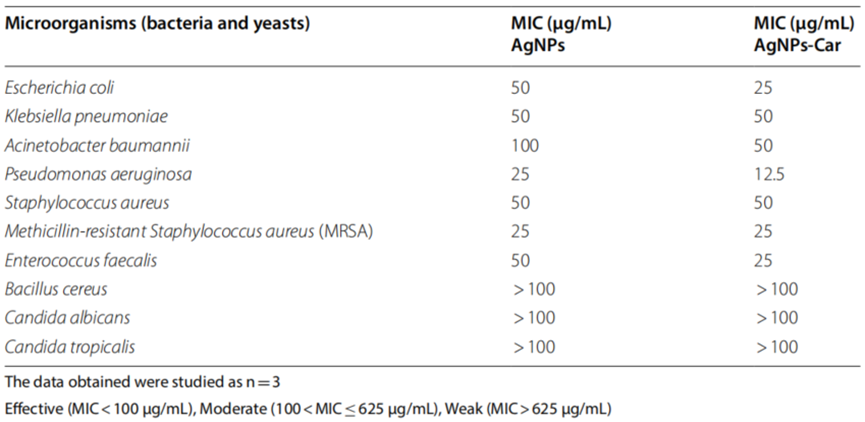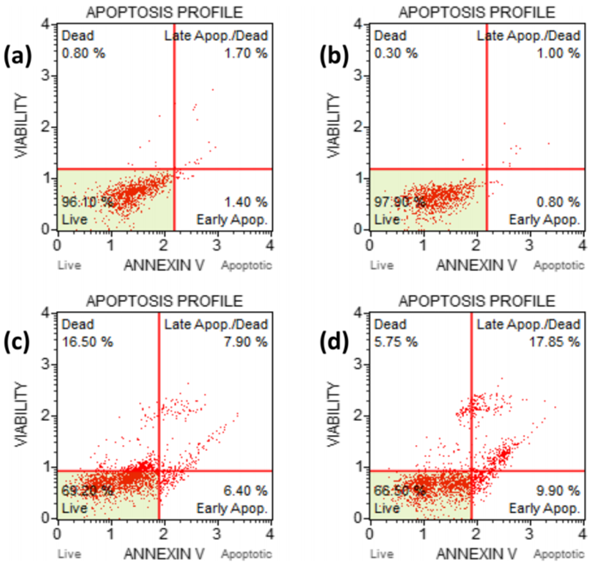Editor: Tiffany
Researchers have developed silver nanoparticles loaded with carboplatin that demonstrate enhanced anticancer activity against breast, lung, and brain cancer cells, while also exhibiting strong antimicrobial effects against antibiotic-resistant bacteria.
Key Highlights
- Research Question:
Can silver nanoparticles loaded with carboplatin (AgNPs-Car) improve the efficacy of carboplatin in treating cancer while also providing antimicrobial benefits? - Research Difficulties:
Overcoming the limitations of carboplatin, such as systemic toxicity and poor targeting, and addressing the challenge of antibiotic-resistant infections in cancer patients. - Key Findings:
AgNPs-Car showed significantly higher anticancer activity than carboplatin alone, particularly in brain cancer cells, and demonstrated strong antimicrobial effects against pathogens like Pseudomonas aeruginosa and MRSA. - Innovative Aspects:
The use of silver nanoparticles as a drug carrier to enhance carboplatin’s delivery and potency, while leveraging the inherent antimicrobial properties of silver. - Importance of the Study:
This dual-purpose approach could reduce the side effects of chemotherapy, improve treatment outcomes for cancer patients, and offer a new strategy to combat antimicrobial resistance.
Challenges in Cancer Treatment and Antimicrobial Resistance
Cancer remains one of the leading causes of death worldwide, with specific types such as breast cancer, lung cancer, and brain cancer posing significant challenges to patients and healthcare systems. Breast cancer, tested in this study using MCF-7 cells, often manifests as lumps, changes in breast appearance, or persistent pain. Lung cancer, modeled with A549 cells, is characterized by symptoms like chronic cough, chest pain, and shortness of breath. Brain cancer, represented by C6 glioma cells, frequently results in debilitating headaches, seizures, and neurological deficits. These conditions severely impact patients’ quality of life, underscoring the need for effective therapies.
Currently, chemotherapy drugs like carboplatin are a cornerstone of cancer treatment. Carboplatin functions by damaging the DNA of cancer cells, halting their proliferation. However, its effectiveness is hampered by significant limitations. The drug often causes systemic toxicity, affecting healthy cells and leading to side effects such as nausea, hair loss, and immune suppression. Additionally, its ability to target brain tumors is restricted by the blood-brain barrier, a natural defense mechanism that limits drug penetration into the brain. These shortcomings highlight the critical need for innovative solutions that enhance drug delivery and minimize toxicity.
Beyond cancer, the rise of antibiotic-resistant bacteria, such as methicillin-resistant Staphylococcus aureus (MRSA) and Pseudomonas aeruginosa, complicates treatment, particularly for immunocompromised cancer patients. The dual burden of cancer and infection necessitates therapies that can address both issues simultaneously.
Developing a Dual-Purpose Therapeutic Agent
The study, conducted by Dr. Tutku Tunç and her team at Sivas Cumhuriyet University, aimed to overcome the limitations of carboplatin by integrating it with silver nanoparticles (AgNPs), known for their antimicrobial properties and ability to penetrate cellular barriers. The researchers developed AgNPs loaded with carboplatin (AgNPs-Car) to create a dual-purpose therapeutic agent. The objectives were clear:
- Assess Anticancer Efficacy: Investigate the ability of AgNPs-Car to inhibit the growth of cancer cells, including MCF-7 (breast cancer), A549 (lung cancer), and C6 glioma (brain cancer) cell lines, and compare its performance to carboplatin alone.
- Evaluate Antimicrobial Activity: Test the effectiveness of AgNPs and AgNPs-Car against a range of pathogens, including Gram-positive and Gram-negative bacteria such as MRSA and Pseudomonas aeruginosa.
Published on January 6, 2024, in Cancer Nanotechnology, this research sought to determine whether AgNPs-Car could improve the targeted delivery of carboplatin, reduce its toxicity, and provide an additional antimicrobial benefit—potentially revolutionizing treatment for cancer patients vulnerable to infections.
Synthesis, Characterization, and Biological Evaluation of AgNPs-Car
The experimental design involved synthesizing silver nanoparticles (AgNPs) and loading them with carboplatin to form AgNPs-Car. The nanoparticles were characterized using advanced techniques:
- Dynamic Light Scattering (DLS) to measure particle size and distribution.
- Energy-Dispersive X-ray Spectroscopy (EDX-STEM) to confirm elemental composition.
- Fourier Transform Infrared Spectroscopy (FTIR) to verify the chemical bonding of carboplatin to AgNPs.
Biological testing included XTT assays to assess cancer cell viability, Annexin V assays to measure apoptosis (programmed cell death), and Minimum Inhibitory Concentration (MIC) tests to evaluate antimicrobial activity. Below are three pivotal experiments from the study:
Key Experiment 1: Anticancer Activity on C6 Glioma Cells
- Procedure: C6 glioma cells were exposed to varying concentrations of AgNPs-Car and carboplatin alone for 24 hours. The XTT assay measured cell viability to determine the IC50 value—the concentration required to inhibit 50% of cell growth.
- Result: AgNPs-Car exhibited an IC50 of 16.18 ± 0.45 µg/mL, significantly lower than carboplatin’s IC50 of 54.66 ± 1.34 µg/mL.
- Finding: AgNPs-Car demonstrated superior potency against C6 glioma cells, suggesting that the nanoparticle system enhances carboplatin’s effectiveness, potentially due to improved penetration across cellular barriers like the blood-brain barrier.

Table 1. IC50 results of the AgNPs-Car, carboplatin, and AgNPs.
Key Experiment 2: Antimicrobial Effects on Pseudomonas aeruginosa
- Procedure: The MIC test assessed the lowest concentration of AgNPs-Car needed to prevent the growth of Pseudomonas aeruginosa, a notorious antibiotic-resistant Gram-negative bacterium.
- Result: AgNPs-Car achieved an MIC of 12.5 µg/mL, indicating strong antibacterial activity.
- Finding: The system’s ability to inhibit Pseudomonas aeruginosa growth highlights its potential as an antimicrobial agent, offering a new tool to combat infections that conventional antibiotics struggle to treat.

Table 2. Antimicrobial activity results of the AgNPs and AgNPs-Car.
Key Experiment 3: Apoptosis Induction in Cancer Cells
- Procedure: C6 glioma cells were treated with AgNPs-Car or carboplatin alone, and the Annexin V assay quantified early and late apoptosis after treatment.
- Result: AgNPs-Car induced early apoptosis in 9.90% of cells and late apoptosis in 17.85%, compared to 6.40% and 7.90%, respectively, for carboplatin alone.
- Finding: The higher apoptosis rates with AgNPs-Car indicate that it not only kills cancer cells more effectively but does so through a controlled mechanism, potentially reducing collateral damage to healthy tissues.

Table 3. Percentage ranges of C6 cells after Annexin V/PI.

Figure 1. (a) Annexin V. Carboplatin on WI-38 cells, (b) AgNPs-Car WI-38 cells, © carboplatin on C6 cells, (d) AgNPs-Car on C6 cells.
Implications for Cancer Therapy and Infection Control
The research by Dr. Tutku Tunç and her team marks a significant step forward in addressing the dual challenges of cancer and antimicrobial resistance. The study demonstrated that AgNPs-Car outperforms carboplatin alone in killing cancer cells, particularly C6 glioma cells, with an IC50 value over three times lower (16.18 ± 0.45 µg/mL vs. 54.66 ± 1.34 µg/mL). This enhanced efficacy, coupled with increased apoptosis, suggests that silver nanoparticles improve carboplatin’s delivery and potency, potentially overcoming barriers like the blood-brain barrier and reducing the required dose—thus minimizing toxicity.
Equally impressive is AgNPs-Car’s antimicrobial prowess. With an MIC of 12.5 µg/mL against Pseudomonas aeruginosa and effectiveness against other pathogens like MRSA, it offers a promising solution for infections that plague cancer patients with weakened immune systems. This dual functionality sets AgNPs-Car apart as a versatile therapeutic agent.
The study directly tackles the limitations of current cancer therapies—systemic toxicity and poor targeting—by leveraging the unique properties of silver nanoparticles. It also addresses the growing threat of antibiotic-resistant bacteria, a critical concern in modern medicine.
In conclusion, this innovative approach from Sivas Cumhuriyet University could transform treatment strategies for patients battling cancer and infections. By enhancing drug delivery, reducing side effects, and combating resistant pathogens, AgNPs-Car represents a beacon of hope in the ongoing fight against two of humanity’s most formidable health adversaries.
Reference:
Tunç, Tutku. “Synthesis and characterization of silver nanoparticles loaded with carboplatin as a potential antimicrobial and cancer therapy.” Cancer Nanotechnology 15.1 (2024): 2.
